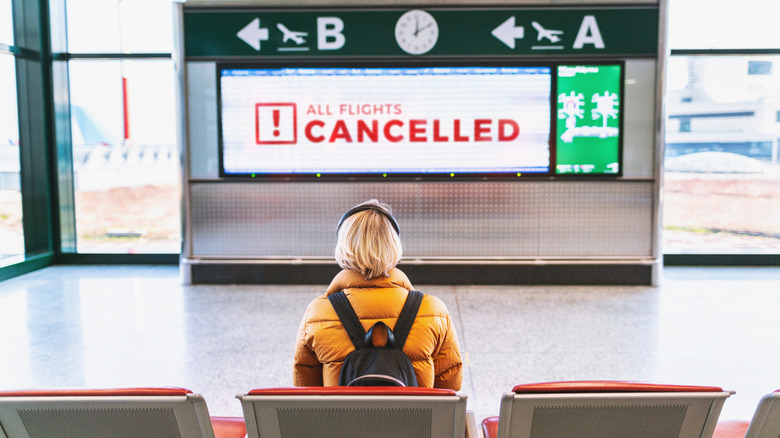Travel Insurance: What Is It And Do You Need It?
Car insurance? Check.
Homeowner's or renter's insurance? Check.
Travel insurance? Well, actually no — it's not something I ever really thought about.
If you're unfamiliar with the type of insurance that could protect you from certain financial risks before, during, or even after your trip (lost luggage, anyone?), you're not alone. But with so many fascinating spots around the globe to experience — and modes of travel such as expedition cruising making it easier to visit remote destinations — the travel insurance industry has been on a growth curve. Add in shifting global weather patterns that cause floods, droughts or fires, both at home and abroad, creating havoc for those forced to cancel or interrupt travel because of them, and being insured seems like a good bet.
And yet like all insurance, a travel policy isn't a one-size-fits-all solution and there are major caveats to what's actually covered. But what is offered — both trip cancellation and emergency medical coverage — does let purchasers easily tailor coverage to their needs.
Here's a quick primer on everything you need to know about travel insurance.
When and why to buy travel insurance
Travel involves a broad spectrum of experiences, from long weekend getaways to bucket list adventures. Which trips should be insured? If you're simply traveling to visit a friend or relative within the United States and your major expense is airfare, you might not need insurance. If you want to cancel a non-refundable ticket, you can usually get airline credit for a future flight, minus a cancellation/change fee. That said, many airlines do offer affordable trip cancellation insurance at the time of booking, which can be a good option for flight-only trips booked far in advance.
If you're taking a big-ticket trip or traveling to a remote destination — a cruise to the Galapagos or Antarctica, a honeymoon in the South Pacific — or if you book a prepaid package vacation or cruise a year or more in advance to nab a great deal, travel insurance is usually a wise investment. The reasons: Certain types of travel and many international destinations have more inherent risk and booking far ahead of your travel date creates a large window where your own health or financial situation or the health of a loved one could change. Many travel insurance policies also provide expert assistance for things such as replacing a lost passport or serving as interpreters during an overseas medical crisis.
Ultimately, travel insurance makes sense for major trips with large price tags and for most travel outside the U.S., especially if you're older or have health issues that could affect your ability to take or complete the trip.
Types of travel insurance and what they cover
Travel insurance falls into three main categories: Trip Cancellation, Emergency Medical, and Cancel For Any Reason (CFAR). The first reimburses all or part of your prepaid travel costs should you need to cancel or interrupt your trip, while the second is vital for covering unforeseen medical expenses or emergency evacuation when traveling outside the country. CFAR coverage allows you, as its name suggests, to cancel for any reason and still recoup part of your prepaid travel costs.
Note: Most travel insurance policies are designed to cover a single trip and are tailored to your vacation's prepaid cost. Some travel insurance companies also offer an annual or a multi-trip policy valid for an entire year and popular with frequent international travelers. Just be aware that these policies' primary focus is on emergency medical rather than trip cancellation (some cancellation coverage is typically included but the amount quoted is for the entire year not for each trip). This coverage, however, can be a good choice for frequent international travelers for the emergency medical coverage alone.
Here's a look at all three categories.
1. Trip cancellation insurance
Trip cancellation insurance offers protection/reimbursement for the pre-paid, non-refundable cost of your trip should you need to cancel for any of the covered reasons or if your trip is interrupted due to your own illness, canceled flights, or other unforeseeable factors. Most policies also include a daily per diem for hotel and meal expenses should your trip be interrupted or your flight canceled as well as compensation for lost baggage. Coverage varies by policy so it's important to review the reimbursement amounts and exclusions before purchasing.
Here are reasons that generally are covered by trip cancellation policies:
- Illness or injury — of the insured traveler, their partner, or a non-traveling family member.
- Death of a traveling companion, family member, or person who was to be hosting you.
- Natural disasters, acts of terrorism, or emergency evacuations.
- Bankruptcy or financial default of a travel company or provider.
- Loss of employment or income.
- Jury duty or military activation.
Two main caveats: Those with pre-existing medical conditions involving recent treatment or hospitalization need to look for policies that include pre-existing coverage or purchase a CFAR policy. Also, most trip cancellation policies don't cover cancellation due to concern or fear about traveling to a destination — and many specifically state that cancellation due to epidemics or pandemics will not be covered. Travelers also can't buy travel insurance at the last minute when a hurricane is barreling toward their intended destination. If you purchased insurance at the time of booking, however, the pre-paid costs of your cancellation would likely be covered.
2. Emergency medical insurance
This coverage, often bundled together with trip cancellation into one comprehensive policy, is what you can use to get assistance in arranging care and to cover medical costs incurred while traveling internationally (since other countries do not accept U.S. health insurance), especially valuable if you require urgent medical care or emergency surgery. More importantly, most of these policies also provide for medical evacuation to the nearest healthcare facility and, in the case of serious injury or severe illness, back to the U.S.
It's also worth noting that some policies will cover your medical costs and return transportation if you fall ill while traveling during an unforeseen epidemic — as long as you purchased the insurance prior to the outbreak.
3. Cancel for Any Reason (CFAR) insurance
In uncertain times — due to personal health issues, the health of a family member, or a worldwide crisis — prudent travelers can purchase what is known as a Cancel For Any Reason (CFAR) policy, which will cover up to 75 percent of prepaid, unreimbursed costs as long as you buy the policy at least 14 or 21 days after booking your trip (this varies by policy) and cancel at least 48 hours prior to your scheduled departure.
These policies, which are rising in popularity, are priced at a premium but offer a financial buffer for unforeseen issues that could require you to cancel your travel plans.
How much does travel insurance cost?
Insurance premiums vary greatly based on several factors, including trip cost, trip length, destination, age and state of residence of the traveler, and the dollar amount of coverage. On average, prices range from about 4 percent to 10 percent of a trip's cost, with CFAR coverage adding roughly 50 percent on top of that. Younger travelers will also pay less than older ones.
Annual or multi-trip policies start at about $300 and increase from there based on the traveler's age and amount of coverage requested. To compare prices, check out sites such as InsureMyTrip.com and TravelInsurance.com, or browse the plans offered by major insurers such as Allianz Global Assistance or AIG Travel Guard.
Do you really need travel insurance?
As with all insurance, you hope not to ever have to use it. The premiums you'll pay are a hedge against the unknown — your health, world events, travel company bankruptcies — and are often worth it for the peace of mind. After comparing policies, carefully reading what's included and excluded, and deciding which coverage is best for you, the world awaits.







